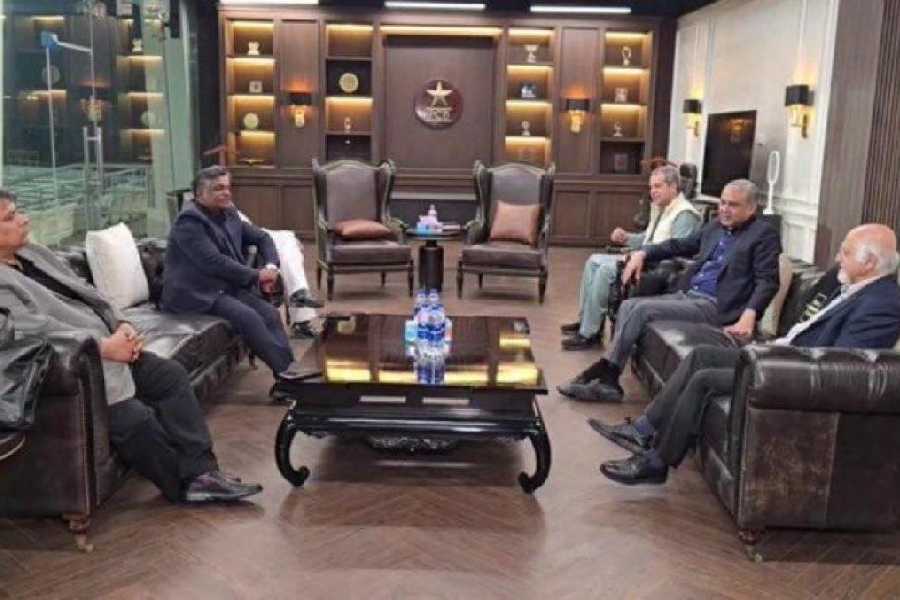 |
| A crowd at Mairang reads out resolutions to be adopted at the 4th Special Session of the People’s Parliament of the Grand Council of Chiefs of Meghalaya in Mairang, West Khasi Hills district |
Mairang, Feb. 15: He is a “king” with a lot on his mind - upholding the legacy of great syiems (chiefs) like freedom fighter and chief of Nongkhlaw kingdom in Khasi hills U Tirot Sing for one and keeping the age-old traditions of Meghalaya alive for another.
Paiem Phrester Manik Syiemlieh, the syiem (chief) of Nongkhlaw and vice-president of the Grand Council of Chiefs of Meghalaya and Federation of Khasi States said, “He (Sing) fought the British and died in captivity in Dhaka in 1835. And here we are…” All the while, he chewed kwai, the addictive raw betel nut, and took long drags from a filter-less cigarette.
On Wednesday, Manik and council chairman John F. Kharshiing had organised the dorbar ri, the fourth special session of the peoples parliament of the council. Their agenda: to push for recognition to syiems by Sixth Schedule institutions — a marriage of sorts between traditional institutions and modern democratic ones.
They said the timing of the demand, made a week before the February 23 Assembly polls, was important. “We intentionally held the meeting during this election season so that we can test how political parties react,” Kharshiing said.
Ironically, though the chiefs claim they are apolitical, Kharshiing does not hide the fact that he will campaign for the Congress.
After Independence, 25 Khasi hill state chiefs had formed a federation. On August 17, 1948, then-Governor General C. Rajagopalachari had accepted the instrument of accession. Over the decades, unlike most former royals elsewhere in India, the Meghayala chiefs’ traditional status has remained intact. The villagers still register their land with the chiefs. Legally, however, they have no powers, with the Sixth Schedule councils saying that the chiefs cannot register anything without permission. So Kharshiing may have donned an embroidered golden turban but as the gathering dispersed from the Tirot Sing ground, he picked up banners and loaded them on to a truck. Minutes earlier, Kharshiing was reading out an eight-point resolution from a three-feet-high stage and hundreds of young and old men and women raised hands to adopt it. The most basic demand was to provide financial help to the once powerful chieftains.
The chiefs, including the dolois of Jaintia hills and nokmas of Garo hills, seemed united, as many of them attended, though many others asked leave of absence because of a lack of transport. The meeting was held 44km from Shillong in this town in West Khasi Hills.
“None of these hundreds of people have been paid anything. They have all come on their own, some of them in open trucks,” said Kharshiing. The crowd patiently heard the speakers, some of whom referred to the special status enjoyed by Jammu and Kashmir and Nagaland.
Mairang Congress candidate Eureka Lyngdoh was also present.
“What they are demanding will require an amendment to the Sixth Schedule,” said PCC chief and former Meghalaya chief minister D.D. Lapang. “The traditional and the modern have to coexist.”
To start with, the chiefs have asked the state government to make budgetary provisions for the chiefs to “perform their legislative, executive and judicial functions” for some 6,500 villages.
Young first-time voters heard the elders and like any other young people, they got confused. A second year BA student, Kenessing Kurbah, felt modern democratic institutions, for all their weaknesses, offered more freedom unlike the stifle of the past. “But the chiefs should also remain; they are tradition,” he said.
Apparently, the Mukul Sangma government also agrees. The Congress manifesto promises specific budgetary support and measures for “effective empowerment” of these traditional institutions.
In 2004, regional parties, including the UDP, had also supported a stronger traditional system. After all, they are modern in their own right.
“The succession to the gaddi was not, in all cases, hereditary; the new syiem was generally elected by the people,” states a 1950 document of the government's then-ministry of states.










